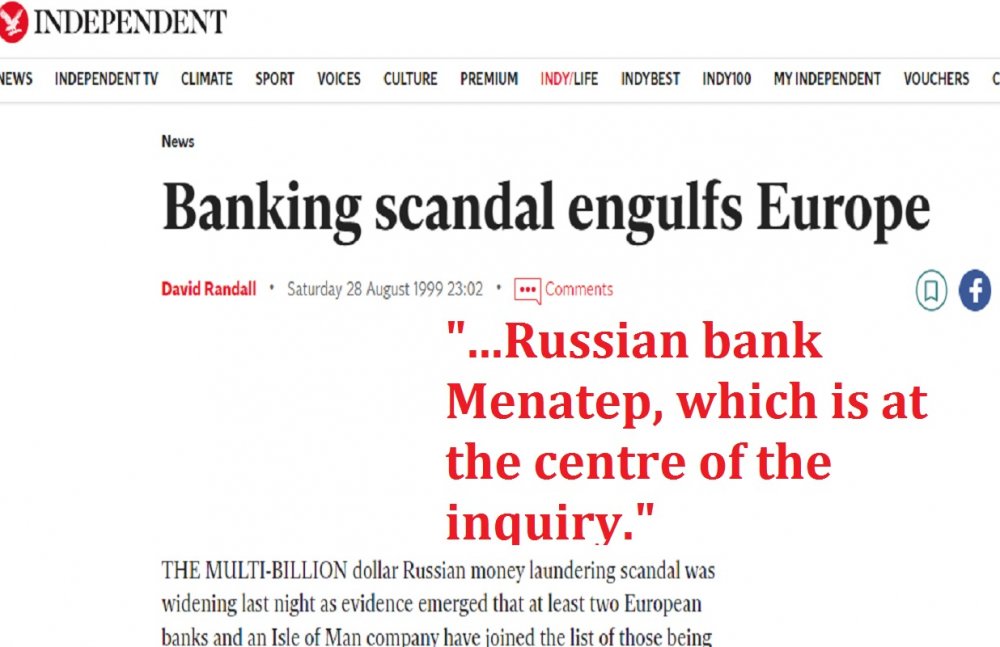
By David Randall, Saturday 28 August 1999, published: “Mr Kagalovsky was Russia's representative to the IMF from 1992 to 1995. He is now vice president of Russian oil giant Yukos”.
“THE MULTI-BILLION dollar Russian money laundering scandal was widening last night as evidence emerged that at least two European banks and an Isle of Man company have joined the list of those being investigated.
The affair, which began with reports that up to $15bn was reportedly funnelled through the Bank of New York by Russian mobsters, is mushrooming daily. In what is almost certainly the world's biggest money laundering inquiry, it has now emerged that up to five banks are involved, funds from the $1bn food aid programme to Russia may have been diverted, and that up to a dozen authorities have launched formal investigations.
They include the US Treasury Department, FBI, New York District Attorney's office, US Agriculture Department, International Monetary Fund, Britain's National Crime Service, Swiss and Hungarian prosecutors and tax offices, the Russian Prosecutor's office and the Russian Federal Security Service, successors to the KGB. In the US, the House Banking Committee is to stage hearings into the matter next month.
Among the accounts being checked by investigators are those held at a growing number of banks, including UBS AG and Credit Suisse Group. US agencies are also looking into the role of Valmet, a financial adviser based on the Isle of Man. Valmet is part-owned by Russian bank Menatep, which is at the centre of the inquiry. The husband of another suspended Bank of New York official, Natasha Kagalovsky, is Konstantin Kagalovsky, a former senior official at Menatep. Valmet's Moscow office is an apartment that is said to be owned by an officer of Russia's foreign intelligence service.
Mr Kagalovsky was Russia's representative to the IMF from 1992 to 1995. He is now vice president of Russian oil giant Yukos. The couple issued a statement on Thursday denying any wrongdoing and calling reports of Russian mob involvement an "anti-Russian campaign".
There was also a growing mystery surrounding Lucy Edwards, the senior official at the Bank of New York's London office in charge of eastern European operations. Ms Edwards, who reportedly had authority over some of the suspect accounts, was fired by the bank late on Friday night for "alleged gross misconduct, violations of the bank's internal policies, falsification of bank records, and failure to co-operate".
Investigators suspect that billions of dollars were moved through accounts at the Bank of New York, partly through a company called Benex Worldwide Ltd. Ms Edwards' husband, Russian businessman Peter Berlin, is listed as a director of Benex.
Reports in the US claim about $6bn has passed through the Benex account in more than 10,000 transactions since last autumn. One US official said this was "just the tip of the iceberg".
Evidence found by British police during a search of Ms Edwards' London apartment last week allegedly included Bank of New York stationery bearing Ms Edwards' home address. Investigators suspect she may have been conducting business from her home using the bank's name, the report said.
Ms Edwards is rumoured to be staying in Moscow at the Palace Hotel, but when the Independent on Sunday checked the hotel denied she was a guest.
Further developments yesterday revealed that US and British investigators have been monitoring accounts at two US banks for a year. In August 1998 the Republic National Bank filed a formal Suspicious Activity Report to the US Treasury Department concerning a large transfer from one of its accounts to one at the Bank of New York in the name of Benex Worldwide. The Treasury then called in the FBI, which has monitored the accounts since.
Some of the more colourful speculation about the source of the laundered funds has centred on money advanced to Russia by the IMF. Some reports have had up to $10bn of IMF money involved, but this is fully half the $20bn lent to Russia in the last seven years. Other reports, principally in USA Today, have even linked the cash to prostitution rackets, and art and jewellery stolen from Russian Jews.
The truth is likely to be more prosaic. There are more dollars in Russia than in any country outside the US, and transferring sums overseas is not just a criminal activity but routine business practice for Russian firms. Many staff are paid, partly or wholly, in dollars deposited in offshore banks. Firms trading with Russia often insist on payment in dollars offshore, and punitive Russian commercial taxes encourage firms to do so.
The Swiss element in the labyrinth centres partly on allegations of possible corruption in the awarding of contracts to construction firm Mabetex for a pounds 550m Kremlin renovation. An Italian paper reported this week that Mabetex allegedly paid $1m into an account in Hungary for Russian President Boris Yeltsin's use. The Kremlin has issued vigorous denials.
Next week Nikolai Volkov, Russia's Chief Investigator for Serious Economic Crimes, goes to Switzerland to see the country's Federal Prosecutor, Carla del Ponte. The Swiss were first alerted to the scandal by former chief prosecutor Yuri Skuratov. Skuratov was sacked earlier this year after state television leaked video footage showing a man who looked like him cavorting with two prostitutes.” – notes INDEPENDENT in the article “Banking scandal engulfs Europe”.